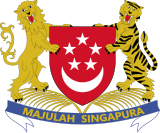
| This article is part of a series on |
 |
|---|
|
|
The Presidential Council for Minority Rights (PCMR) is a non-elected government body in Singapore established in 1970, the main function of which is to scrutinize most of the bills passed by Parliament to ensure that they do not discriminate against any racial or religious community. If the Council feels that any provision in a bill amounts to a differentiating measure, it will report its findings to Parliament and refer the bill back to Parliament for reconsideration. The council also examines subsidiary legislation and statutes in force on 9 January 1970. One member of the PCMR is nominated by the chairman to the Presidential Elections Committee, which is empowered to ensure that candidates for the office of President have the qualifications required by the Constitution. The President also appoints and dismisses the chairman and members of the Presidential Council for Religious Harmony ("PCRH"), established by the Maintenance of Religious Harmony Act (Cap. 167A, 2001 Rev. Ed.), on the advice of the PCMR, and the PCMR is responsible for determining whether PCRH members who are not representatives of major religions in Singapore have distinguished themselves in public service or community relations in Singapore.
The council is made up of its Chairman (as of 6 November 2012 the Chief Justice of Singapore, Sundaresh Menon), up to ten permanent members who are appointed for life, and up to ten ordinary members who are appointed for a period of three years and may be re-appointed. Appointments are made by the President on the advice of the Cabinet. If the President does not concur with Cabinet's advice, he may veto appointments. However, he is required to consult the Council of Presidential Advisers ("CPA"), and if the CPA does not concur with his view, Parliament may override his decision with a resolution passed with a two-thirds majority vote. The President has no power to remove current PCMR members.
The Constitution only requires members of the council to be Singapore citizens residing in Singapore who are at least 35 years old. There is no restriction on Cabinet ministers and members of political parties. Moreover, the Prime Minister may authorize any Minister, Minister of State or Parliamentary Secretary to attend Council meetings. It has been noted that this may have a chilling effect on the council's deliberations as such a guest might be the author or a vocal proponent of the legislation under scrutiny. On the other hand, it has been suggested that members with political affiliations can often make the biggest contribution towards the council's discussions. Another criticism of the PCMR's composition is that having judges on the Council may lead to a conflict of interest as they may have to exercise judicial review over Acts of Parliament they have either endorsed or rejected previously.
All proceedings of the council are conducted in private, and the council is prohibited from hearing objectors or examining witnesses regarding any bill or law under consideration. Since its establishment, the PCMR has not found any legislation to contain differentiating measures.
© MMXXIII Rich X Search. We shall prevail. All rights reserved. Rich X Search
